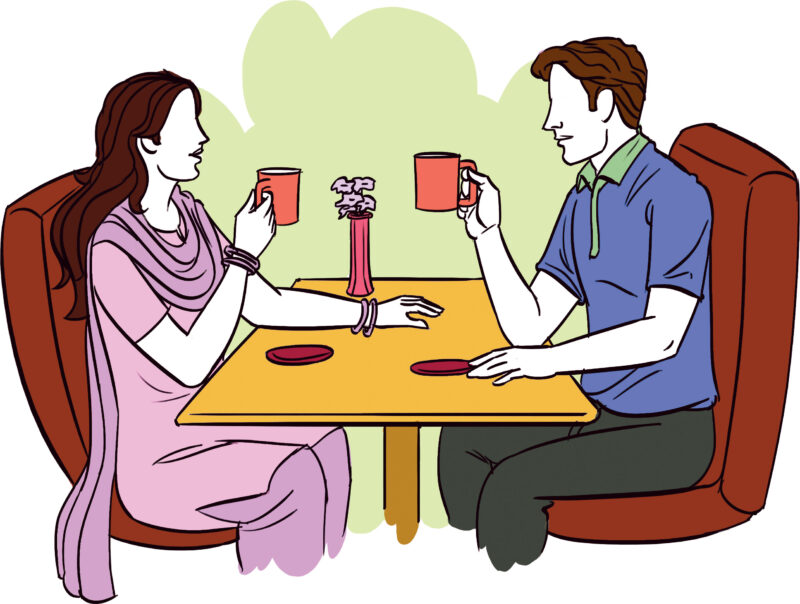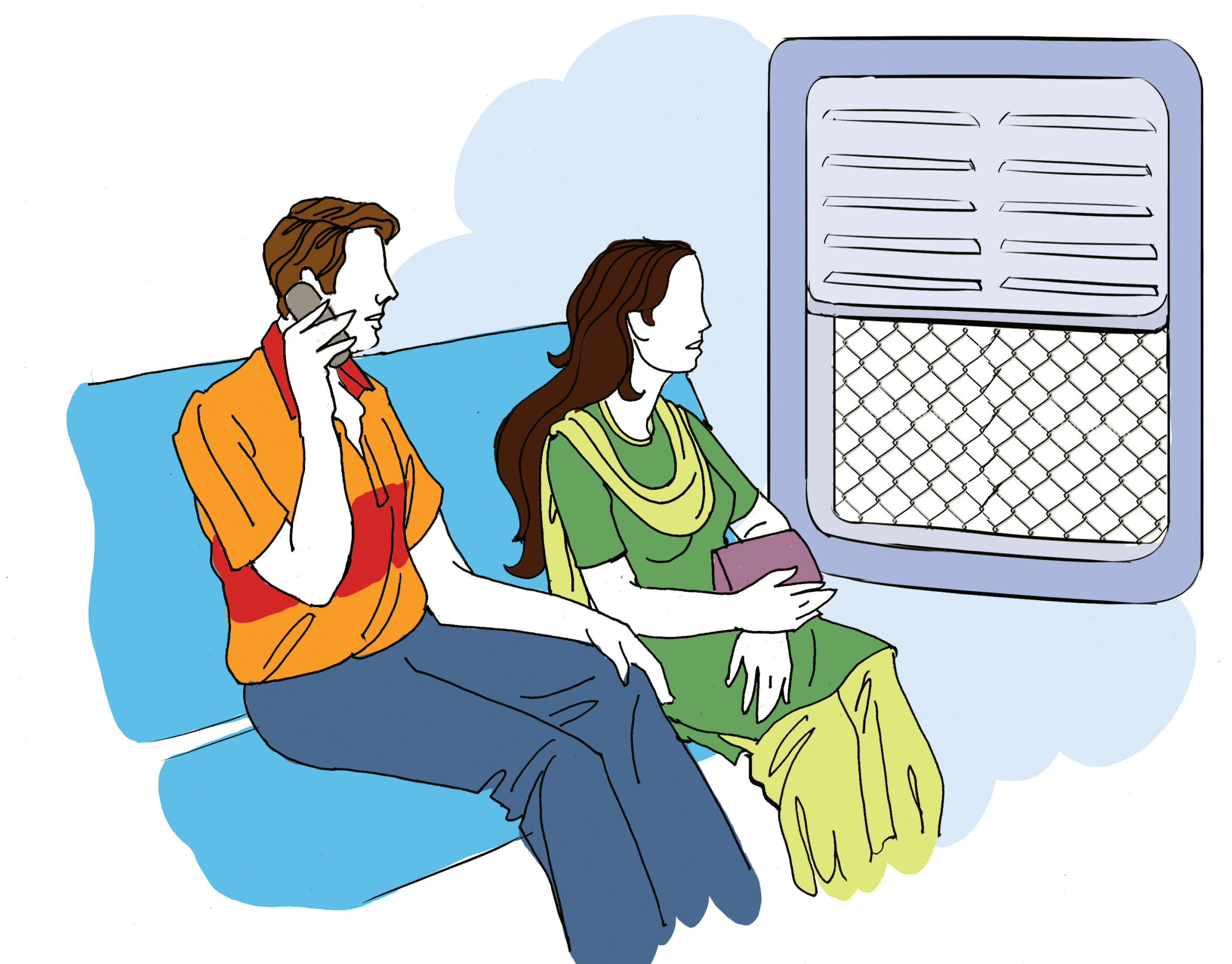The loneliness does not stop.
It begins with the first splash of cold water on my face and infiltrates into every part of my body under the shower. It blossoms as I dress, it mixes in my coffee. It closes on me slowly, as I close the door of my home.
As the day progresses, the feeling also grows. It interrupts my work in office. It continuously lingers on my mind. Like that slow, last kiss years ago. I can feel it residing in my footsteps, heavy, as I board the local train back home. My loneliness—my disability.
And then I see her.
Sitting in her usual place by the window in the train, oblivious to the crowd. Her long, silky hair, moving swiftly with the wind. Her delicate fingers interlaced with each other. Her face, so soft, so naïve. Her eyes, looking outside the window, searching for something, as avidly as I am trying to find something of purpose in my strange, closed life.
I always manage to sit around her. On lucky days, I get a seat opposite hers. On luckier days, she notices my presence, breaking her intense reverie—she breathes in, turns her head quickly to look in my direction with those deep, brown, mesmerising eyes, but only for
a fraction of a minute. She then looks down coyly, smiles slightly to reveal a small dimple, and continues her blank, unblinking stare, outside the window. It is an interlinked pattern, which never fails to repeat. It’s a repetition I wish to always be repeated.
I remember that evening when I got a seat just next to hers. I received a phone call from my distant mother—distant in terms of time, place and person. As I spoke, I noticed her letting go of her endless gaze outside and looking at her feet, as if listening to every word intently. To confirm her eavesdropping, I cracked a small joke (much to my mother’s surprise), and she laughed! That was it—it became another of our patterns from that day—I always call my mother on my way back from office, and she always lends a listening ear. However far I am from her, she manages to interject my conversation with her responses—a look of surprise, an expression of melancholy or that slight tinkling laughter—matching perfectly to everything I say. The talks with my mother now encompass a variety of events and emotions, only to see deviations from that blank look of hers to a wide array of expressions.
So much so, sometimes, I forget who I am actually having the conversation with! My mother thinks I have finally changed my strange ways—keeping in touch with her like a good son, having such upbeat conversations, but well, the less said about the underlying strange reasons for it, the better!
She gets down a station before mine, being very cautious to not disturb anyone in her attempt to reach the exit door of the compartment, but nevertheless ending up bumping into some. In the few instances where she accidentally brushes against my legs, I see her stop dead in her tracks for a few seconds, bring a thin hazy smile on her lips, and continue her intermittent, staggering walk like the other many passengers. Once she exits, it is impossible to see her again in the pool of people. Her station is an extremely crowded one, and she gets lost in the crowd.
But she makes a cosy home in my thoughts till the next evening. I see myself waiting to get done with work and catch the train back home. I hear myself hoping that she has caught the same one, which is usually the case. It seems as if the universe is conspiring for this recurrence to occur in an eternal loop unless one of us breaks it with words. It has been three months since this repetition of events began, and it is starting to bring about a subtle change in me.

What is this sudden emotion enveloping me? I can see it withering away—my loneliness—like noisy, autumn leaves, shedding slowly, but surely. Out of all the hypothetical situations with her that I create regularly in my head, I have never even had a real conversation with her. But there is this unsaid, untouched association that links us together. What is it about certain people that you feel completely at ease with them? I don’t gaze at any other girl so incessantly, notice such slight differences in anyone’s behaviour or try to catch someone’s attention all the time.
What is making me share a comfort zone with this unknown person. Her aura? Her energy? Or simply,
a strange connection?
My mother always tells me that I see only what I want to see. Is this the case here too? Am
I misinterpreting her responses? I would probably have an answer to it only when I muster the courage to talk to her—which is the most difficult thing to do for an isolated person like me. I live in my own world—a private me-zone that forms a thick, non-penetrable layer around me. What if I let her into my personal space and I have to face another rejection? Sometimes, confusion is preferable than clarity.
But it has been three days now since I have seen her, and the unrest in me is spreading throughout my consciousness. And so, on the fourth day, when I see her again (thankfully), I realise I must have a word with her lest I never see her again. I pray hard to a god I’ve never prayed to before and decide to get down at her station. I have no idea of what I am going to talk to her, but her absence has given me a strong push.
As I get down, I lose myself in the swarm of people, unable to see her. I push myself through the crowd, searching frantically for her, but she is nowhere to be seen. I see a lot of familiar faces from the journey
but not hers. How can she just vanish into thin air?
Just as I am about to dismiss her as a probable paranormal presence, I see her long silky hair, moving swiftly with the wind a few steps ahead of me. I walk towards her till she is at an arm’s length from me.
I put my hand on her shoulder and call out,
“Excuse me!”
She turns around and seems frozen at my touch, with that thin hazy smile appearing on her face like before. She breathes in and tilts her ears towards me, like she is waiting to hear my voice again.
“Hello,” I say. She smiles, deepening her dimples.
But something is wrong. It seems like there exists
a window between us—because she stares at me with that same deep brown, unblinking look like she does when she looks on the other side of the window in the train. I see something shining against the light below. I look down. She is holding a white cane with a red lining, tipped against the floor.
I go blank.
“Are you the boy from the train? The one who talks
to his mother every day?”
Blank.
“Hey! Are you there?” She instinctively moves her cane around, which hits my feet. This time, it is my reverie that breaks.
“Yes, yes,” I say.
“Oh!” she blushes. “Out of all the hypothetical situations I created regularly in my head, I never thought we will actually have a real conversation like this!”
“Oh, ok.”
“Ok?” she frowns for a minute, disappointed. Then she smiles, as if realisation dawned upon her. “Of course, my disability must have surprised you and pushed you away. It’s all right. Nice to meet you.” She starts to leave.
“Wait!” I cry out. “I am sorry. My lack of responses is
a part of my disability.”
“Your disability?” she instinctively reaches out her hands to touch mine, checking its presence.
“Well… all handicaps cannot be seen,” I nervously laugh. “Or felt,” I correct myself.
“Oh, I see,” she says and then laughs at the pun.
As the smell of brewing coffee, at a stall nearby, intermingles with our first real conversation over the next couple of minutes, she asks, “What is it about certain people that you feel completely at ease with them? Their aura? Their energy?”
“Or simply,” I say, “A strange connection?”
Dr Nupur Shrirao


